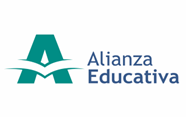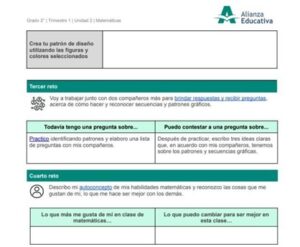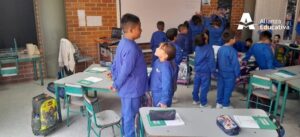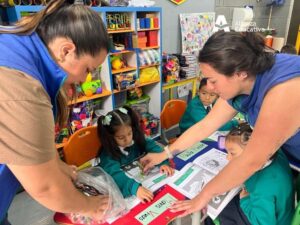
Alianza Educativa’s Navegar Seguro or Smooth Sailing Program
Vision and Mission Alianza Educativa believes that school culture is an essential element, and its main purpose is that all students learn in secure and stable environments. Navegar Seguro or “Smooth Sailing”, our social emotional skills framework for students and adults guarantees the welfare of the academic community. We have a vibrant curriculum for students K-11 (grade 12 in Colombia) that includes academic programs, socio-enotional programs, complementary programs, as well as educational programs that we develop with our partners.
Navegar Seguro was created in 2002; and in 2019, we renewed and strengthened the program. Inspired by the most recent literature about SEL skills and their importance for students’ development, we adapted the Step by Step toolkit developed by the World Bank and created Navegar Seguro 2020. This program was developed to better address the social and emotional learning needs of the children attending our 11 public schools that have over 12,000 students who face economical disadvantages, as well as psychosocial risks such as teenage pregnancy, substance use and abuse, violence, emotional distress, suicidal conduct, cyber risks, disruptive behaviors, and bullying.
At Alianza Educativa we are convinced that no matter the economic status of a family, everyone should have access to high quality education. We opened this possibility for many students and families, closing the inequality gap, and bringing opportunities to thousands of children.
History Alianza Educativa is a non-profit organization established in 2000 by four leading private educational institutions in Colombia in order to contribute to the transformation of education in the country, and to close equity gaps in education. In 2001 we started operating and managing 5 public schools located in Bogotá. In 2018 we received another 6 schools also in the south of the city. In January 2023, the Board approved the management and operation of a school in the Island of Barú, an island close to the city of Cartagena.
As of 2024, we manage and operate 12 schools (11 public schools in Bogotá and 1 private schools in Cartagena). These schools benefit more than 12.400 students of vulnerable communities. We work hand in hand with the parents of these children and with the community to improve the living conditions in these areas.
Program description Navegar Seguro helps students develop their SEL skills to manage the risks present in their environment, build positive relationships, and develop their life project. Students achieve these slills by getting to know themselves better, learning to regulate themselves, developing their social awareness, engaging in positive communication practices, setting and achieving their own goals, and taking responsible decisions for their present and future. Navegar Seguro also encourges children to be active participants in their own social and emotional learning process, giving them tools to self-assess their SEL skills.
The development of social-emotional skills is key to ensure children’s personal, academic, and professional success in life. To achieve that, it is important to carry out a robust social-emotional development strategy that goes beyond the classroom, permeating all aspects of school life. Navegar Seguro works with all relevant parties in our students’ education. We incorporate SEL in the school curriculum in a way that mutually reinforces academic content, and complements SEL contents with activities that allow students to make meaningful connections with their day-to-day lives.
Socioemotional competences provide our students with tools to face economical disadvantages, as well as psychosocial risks such as teenage pregnancy, substance use and abuse, violence, emotional distress, suicidal conduct, cyber risks, disruptive behaviors, and bullying. Navegar Seguro has the purpose of helping students develop their SEL skills to manage the risks present in their environment, build positive relationships, and develop their life project. Students will be able to achieve that by getting to know themselves better, learning to regulate themselves, developing their social awareness, engaging in positive communication practices, setting and achieving their own goals, and taking responsible decisions for their present and future. Navegar Seguro also impulses children to be active participants in their own social and emotional learning process, giving them tools to self-assess their SEL skills.
Activities Navegar Seguro includes 24 class sessions from kindergarten to 11th grade. Each session centers around one of the 18 SEL skills from our framework.(See link under “Recommendations.”)

Six additional sessions include: 3 sessions reinforce emotional awareness, empathy, and stress management by practicing mindfulness, 2 sessions reinforce responsible decision making with an emphasis on caring about public goods and using social networks responsibly, and 1 session reinforces self-concept and self-care of one’s own body. The 18 specific SEL skills of our framework are distributed in 6 general skills, which are in turn distributed in 3 dimensions, as follows:
- With myself: this dimension includes the general skills of self-awareness (which includes self-concept, self-efficacy, and emotional awareness) and self-regulation (emotional regulation, delayed gratification, and frustration tolerance)
- With others: this dimension includes the general skills of social awareness (which includes perspective-taking, empathy, and prosocial behavior) and positive communication (which includes active listening, assertiveness, and conflict management)
- With our challenges: this dimension includes the general skills determination (which includes achievement motivation, perseverance, and stress management) and responsible decision-making (which includes generation of options, critical thinking, and analysis of consequences).
Navegar Seguro’s class sessions are designed to consider the following pedagogic principles:
- Learning by doing. Teachers create and find opportunities for children to put into practice what they learn in the classroom about SEL skills, with an increasing difficulty level.
- Significative learning. Students are encouraged to establish relationships between SEL skills and their day-to-day experiences so that they can find them useful and put them into practice in other aspects of their life.
- Intrinsic motivation. It is important to have students learn and practice their SEL skills because of the inherent satisfaction they get from doing so, rather than because they feel it is mandatory.
- Zone of proximal development: Activities are designed to be challenging for students so that they can be solved with effort and the guidance of their teacher or more skilled peers.
- Social interaction: Students have the opportunity of interacting with their peers by engaging in activities for groups and for pairs that promote cooperation, collaborative learning, debate, and critical thinking.
In 2023 we began integrating socio-emotional competencies into all academic areas through the design of instructional guides to intentionally foster their development beyond the hidden curriculum and structured programs. We do this
through a challenge that allows the implementation of a specific socio-emotional competency in each class, as established in the instructional guide. Example in mathematics of the development of the socio-emotional competency: self-concept.


Audiences
Students: Our target group: Children of school-age; students from 3 to 18 years. Currently, we manage 11 official schools (charter schools), located in 5 areas of Bogotá and our private school in Baru. These schools benefit more than 12.400 students of vulnerable communities and we work hand in hand with the parents of these children and with the community to improve the living conditions in these areas.
Parents and Community: We provide training for families through family schools focused on the development of parenting and socio-emotional competencies to support their children, addressing contextual needs. Additionally, we conduct short activities at home so that students and their families can put into practice socio-emotional competencies for the prevention of psychosocial risks, the development of students’ life projects, and the promotion of healthy coexistence.
Teachers: We have a training plan consisting of 5 levels aimed at developing the capacities of teachers, school leaders, and welfare teams to promote students’ socio-emotional development. The goals of the training plan are:
- Understanding the framework of socio-emotional competencies, their relevance for the comprehensive education of the student, and their relationship with the student profile.
- Implement the Navegar Seguro program and complementary programs with 100% conviction to ensure the development of competencies in students.
- Being able to start a personal process of reflection and development of their own socio-emotional competencies, identifying everyday situations for their application in the classroom
- Promoting a positive classroom climate through assertive leadership strategies, including care, motivation, and participation.
- Designing and implementing strategies to promote the intentional development of socio-emotional competencies in all members of the educational community, in different educational settings
Other programs and partners: In our 12 schools we implement other programs that have a positive impact on our children. For example, for those students who have some type of physical or cognitive disability “Superaula” aims to provide specialized and individualized support for those students who have learning difficulties and disabilities. Súperaula aims to strengthen basic learning skills, and offers support within the framework of inclusive education for the population with disabilities and learning difficulties.
We have worked in other programs with partners such as Velez Reyes + (Nubank´s foundation). At Alianza Educativa, we have identified the need to systematize, qualify, and deploy our best practices to ensure that we offer the same teaching and learning opportunities to ALL our students in all classrooms and schools. In 2022, we launched the systematization project, which has allowed us to develop capabilities for coding and qualifying practices aimed at strengthening the classroom practices of our teachers, supporting and monitoring the adoption of our cultural model in 12 schools, designing a system of actions to guarantee teaching and learning in the classrooms, and providing training to our educational leaders (principals, coordinators, and area leaders) to enable them to offer effective support and feedback to the teachers.
With the International Development Bank we have implemented their programme “Aprendamos todos a Leer”, which is the methodology we use in our schools so that children in their youngest ages can learn to read.
These are just some examples of how we work with our partners
Impact In February 2021, we decided to take this self-assessment tool beyond homeroom and performed a SEL and psychosocial risks diagnosis in our students from 4th to 11th grade (In the United States this would be from 5th grade to 12th grade).
The diagnosis of psychosocial risks is currently carried out through the mental and physical health survey, with the purpose of assessing the general state of psychosocial risks by grades and schools, considering variables such as students’ well-being level, their perception of their family functioning and school coexistence, risky behaviors in sexuality, prevalence of psychoactive substance consumption, cyber risks, and adverse experiences such as sexual, physical, and psychological violence.
As a result, we found out that students are very optimistic about their SEL skills development process, and that a high score on the self-assessment tool had a positive correlation with their wellbeing and family functioning, as well as a negative correlation with the anxiety and sadness score and the prevalence of psychosocial risks. Additionally, following the belief that educators need to develop their own SEL skills to foster them in students, we had our Wellness teams and teachers fill out the self-assessment form and asked them to create an improvement plan for the SEL skills of their choosing.
Since 2020 we have been implementing the self-report instrument of socioemotional competencies in order to assess students’ socio-emotional development. Its purpose is to diagnose the group-level progress in socio-emotional development through questions that inquire about the implementation of these competencies in daily life.
In the results of the students’ socio-emotional competency self-assessment in 2023, the overall average increased from 2.70 to 2.74, from 2022 to 2023, remaining at a medium to high performance level, considering that the highest score is 4.0. The most developed socio-emotional skills overall are self-awareness with an average of 2.96 and responsible decision-making with an average of 2.88.
With evidence we can show a decrease in cases of psychosocial risk. In 2023, school counselors from the 11 schools in Bogotá supported 636 new cases of psychosocial risk, compared to 705 in 2022. Among the psychosocial risks that showed a decrease in new cases between 2022 and 2023 are emotional difficulties, disruptive behaviors, mental health diagnoses, and teenage pregnancy.
Recommendation for its replicability and adaptation to other settings Alianza Educativa has opened the possibility for other schools to implement Navegar Seguro within their classrooms. Anyone can download both the teachers’ and the students’ guidebooks for grades kindergarten to 11° grade by going to the Alianza Educativa website https://alianzaeducativa.edu.co/navegar-seguro/
If you want to incorporate Navegar Seguro in your school, you can go to the Alianza Educativa website and download the teacher and students guidebook. The teachers’ guidebook has a comprehensive explanation of the SEL skills framework used in the program, as well as a step-by-step guide for each session.
So far, Navegar Seguro is only available in Spanish. However, it could be translated by a user to be implemented in another language if they wish to do so. Also Google Translation may be helpful.
If you decide to implement Navegar Seguro in your classroom, we would be thankful to know about your experience. You can do so by reaching out to navegarseguro@alianzaeducativa.edu.co

Contact Information
cgreniez@alianzaeducativa.
info@alianzaeducativa.edu.co
https://alianzaeducativa.edu.co/
https://www.facebook.com/AlianzaEducativaOficial/
https://www.instagram.com/alianzaeducativa/
https://www.youtube.com/channel/UCTCwDZTeiKAo6gIUC-Ng1Og?view_as=subscriber
https://co.linkedin.com/company/alianzaeducativacolombia
